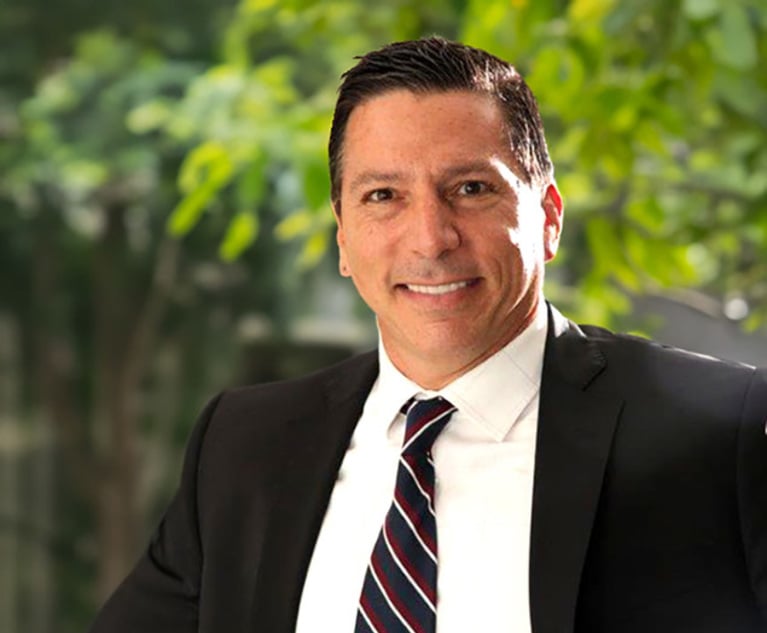 Photo: sondem/Shutterstock.com.
Photo: sondem/Shutterstock.com. Court Scrutinizes State Crackdown on Social Media
Under intense questioning from Judge Kevin Newsom, a lawyer for the DeSantis administration said common-carrier regulations should apply because users are stuck with large social-media platforms once they sign onto the services.
April 29, 2022 at 09:30 AM
5 minute read
 Photo: sondem/Shutterstock.com.
Photo: sondem/Shutterstock.com.
Lawyers for Gov. Ron DeSantis' administration tried to persuade a federal appeals court Thursday to undo a preliminary injunction that blocked a controversial law seeking to prevent social-media behemoths such as Twitter and Facebook from stripping politicians and other users from online platforms.
The arguments before a three-judge panel of the 11th U.S. Circuit Court of Appeals followed a ruling last year by U.S. District Judge Robert Hinkle, who sided with online-industry groups that argued the law — one of DeSantis' top 2021 legislative priorities — violated the First Amendment.
NetChoice and the Computer & Communications Industry Association, groups that represent tech titans such as Twitter, Facebook and Google, filed the lawsuit. The law, in part, sought to prevent large social-media platforms from banning political candidates from their sites and to require companies to publish — and apply consistently — standards about issues such as banning users or blocking content.
Hinkle issued a preliminary injunction a day before the law was slated to go into effect on July 1, 2021.
The industry groups argued the measure violated the First Amendment rights of companies and would harm their ability to moderate content on the platforms.
Lawyers for the state have maintained that the social-media groups are quashing users' speech rights.
Brian Barnes, a private lawyer who represents the DeSantis administration, defended the restrictions during Thursday's arguments, which were held in Montgomery, Ala.
Barnes told the three-judge panel that large social-media platforms such as Twitter — which has roughly 300 million monthly users — should be regulated in the same way as "common carriers," which can include such things as transportation and telecommunications businesses.
Under intense questioning from Judge Kevin Newsom, Barnes said common-carrier regulations should apply because users are stuck with large social-media platforms, once they sign onto the services.
"When a social-media platform becomes large enough, there's this dynamic where it becomes very difficult for people who've joined the platform to switch to a different platform," Barnes said. "And what the Legislature's trying to get at is this sort of market failure where the network effect prevents people from switching in response to a problematic content-moderation policy, in response to the unfair application of a stated content-moderation policy."
DeSantis made the issue a priority after former President Donald Trump was blocked from Facebook and Twitter after Trump supporters stormed the U.S. Capitol on Jan. 6. The governor and Republican lawmakers described the law as protecting free speech.
As an example of potential penalties in the law (SB 7072), companies that violate the prohibition on banning political candidates from platforms could face fines of $250,000 a day for statewide candidates and $25,000 a day for other candidates.
The industry groups' lawsuit and request for a preliminary injunction argued, in part, the measure was politically motivated. The law was designed to address large online platforms, as it applied to companies that have annual gross revenues of more than $100 million or have at least 100 million monthly individual "participants" globally.
"At its core, (the bill) upends the rights of a targeted group of online services to decide what material to display and how that material should be presented," a legal memorandum filed by plaintiffs said. "In other words, the act takes away these private companies' ability to make editorial judgments — a fundamental component of the 'freedom of speech' protected by the First Amendment. Indeed, the act is designed to single out certain online services for special limits on their speech because of the state authorities' open hostility to their perceived political views and 'ideology.' The law is blatantly unconstitutional."
Hinkle's ruling last year called the law "riddled with imprecision and ambiguity."
"The legislation now at issue was an effort to rein in social-media providers deemed too large and too liberal. Balancing the exchange of ideas among private speakers is not a legitimate government interest," Hinkle wrote in a 31-page order.
Paul Clement, a former U.S solicitor general who represents the tech-industry groups, told the three-judge panel — comprised of Newsom and Judges Gerald Tjoflat and Ed Carnes — that the law's focus on large social-media companies illustrates its flaws.
As they passed the law last year, Republican legislators inserted a theme-park exemption that was designed to shield Walt Disney Co. from the social-media restrictions. But they reversed course during a special session last week and removed the exemption after Disney clashed with DeSantis and GOP lawmakers about new state prohibitions on teaching about gender identity and sexual orientation in public schools.
During Thursday's arguments, Newsom asked about the removal of the theme-park exemption.
"The carveout for a subset of big social media platforms … just really is terrible," Clement argued. "In a sense they (the Legislature) just kind of doubled down … It's almost like a test case or a real world demonstration of why speaker-based distinctions are problematic."
Clement likened the tech statute to a law that would apply only to newspapers with a circulation of 1 million or more, except for in-state publications.
"And then one of the in-state newspapers just rips into the Legislature and they say, 'Forget that, we're gonna get rid of that little carveout of the in-state ones.' I think it would show that the whole thing was kind of rotten at the core," he said.
NOT FOR REPRINT
© 2024 ALM Global, LLC, All Rights Reserved. Request academic re-use from www.copyright.com. All other uses, submit a request to [email protected]. For more information visit Asset & Logo Licensing.
You Might Like
View All
Amid Growing Litigation Volume, Don't Expect UnitedHealthcare to Change Its Stripes After CEO's Killing
6 minute read
Florida Court Rules in Favor of Production Co. in Dispute Over Viral Documentary 'Died Suddenly'

'You Can't Do What You've Been Doing,' Lawyer Warns Union as Litigation Heats Up

After Ride's Manufacturer Fails to Appear in Court, Orlando Jury Awards $310M to Parents In Teen's Death
3 minute readLaw Firms Mentioned
Trending Stories
- 1Ex-CFO of San Francisco Law Firms Pleads Guilty to $1.3M Embezzlement Scheme, DOJ Announces
- 2What Does Ohio Supreme Court's Opioid Decision Mean for Public Nuisance Claims?
- 3Bucking Industry Trend, Sidley Austin Elects Biggest Class of Partners in Firm History
- 4US Judge Throws Out Sale of Infowars to The Onion. But That's Not the End of the Road for Sandy Hook Families
- 5‘Really Deflating’: Judges React to Biden Threat to Veto New Judgeships Bill
Who Got The Work
Michael G. Bongiorno, Andrew Scott Dulberg and Elizabeth E. Driscoll from Wilmer Cutler Pickering Hale and Dorr have stepped in to represent Symbotic Inc., an A.I.-enabled technology platform that focuses on increasing supply chain efficiency, and other defendants in a pending shareholder derivative lawsuit. The case, filed Oct. 2 in Massachusetts District Court by the Brown Law Firm on behalf of Stephen Austen, accuses certain officers and directors of misleading investors in regard to Symbotic's potential for margin growth by failing to disclose that the company was not equipped to timely deploy its systems or manage expenses through project delays. The case, assigned to U.S. District Judge Nathaniel M. Gorton, is 1:24-cv-12522, Austen v. Cohen et al.
Who Got The Work
Edmund Polubinski and Marie Killmond of Davis Polk & Wardwell have entered appearances for data platform software development company MongoDB and other defendants in a pending shareholder derivative lawsuit. The action, filed Oct. 7 in New York Southern District Court by the Brown Law Firm, accuses the company's directors and/or officers of falsely expressing confidence in the company’s restructuring of its sales incentive plan and downplaying the severity of decreases in its upfront commitments. The case is 1:24-cv-07594, Roy v. Ittycheria et al.
Who Got The Work
Amy O. Bruchs and Kurt F. Ellison of Michael Best & Friedrich have entered appearances for Epic Systems Corp. in a pending employment discrimination lawsuit. The suit was filed Sept. 7 in Wisconsin Western District Court by Levine Eisberner LLC and Siri & Glimstad on behalf of a project manager who claims that he was wrongfully terminated after applying for a religious exemption to the defendant's COVID-19 vaccine mandate. The case, assigned to U.S. Magistrate Judge Anita Marie Boor, is 3:24-cv-00630, Secker, Nathan v. Epic Systems Corporation.
Who Got The Work
David X. Sullivan, Thomas J. Finn and Gregory A. Hall from McCarter & English have entered appearances for Sunrun Installation Services in a pending civil rights lawsuit. The complaint was filed Sept. 4 in Connecticut District Court by attorney Robert M. Berke on behalf of former employee George Edward Steins, who was arrested and charged with employing an unregistered home improvement salesperson. The complaint alleges that had Sunrun informed the Connecticut Department of Consumer Protection that the plaintiff's employment had ended in 2017 and that he no longer held Sunrun's home improvement contractor license, he would not have been hit with charges, which were dismissed in May 2024. The case, assigned to U.S. District Judge Jeffrey A. Meyer, is 3:24-cv-01423, Steins v. Sunrun, Inc. et al.
Who Got The Work
Greenberg Traurig shareholder Joshua L. Raskin has entered an appearance for boohoo.com UK Ltd. in a pending patent infringement lawsuit. The suit, filed Sept. 3 in Texas Eastern District Court by Rozier Hardt McDonough on behalf of Alto Dynamics, asserts five patents related to an online shopping platform. The case, assigned to U.S. District Judge Rodney Gilstrap, is 2:24-cv-00719, Alto Dynamics, LLC v. boohoo.com UK Limited.
Featured Firms
Law Offices of Gary Martin Hays & Associates, P.C.
(470) 294-1674
Law Offices of Mark E. Salomone
(857) 444-6468
Smith & Hassler
(713) 739-1250






